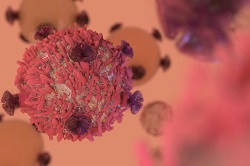T-cell immunotherapy becomes a viable option for pancreatic cancer patients
First discovered for human skin melanoma, the therapeutic potential of tumour-specific T-cells – commonly referred to as T-cell immunotherapy – is tremendous. Reprogrammed T-cells can effectively target the somatic mutations contained in tumour-specific genomic DNA encoding peptide antigens, which means that other types of cancer carrying these somatic mutations, such as lung cancer, are also sensitive to this form of treatment. Unfortunately, things are slightly more complicated with pancreatic cancer. Or so it seemed: Until recently, pancreatic cancer was thought to be poorly immunogenic, as histological analyses had given the impression that these tumours harboured very low numbers of infiltrating T-cells. But the TIPC_TIL_IP project team, headed by Dr. Isabel Poschke of the German Cancer Research Centre (DKFZ), has spent four years meticulously proving these analyses to be wrong. “The lack of T-cell infiltrate in pancreatic cancer is a misconception due to technical reasons,” says Prof. Dr. Rienk Offringa, who brought his expertise in molecular oncology of gastrointestinal tumours to the project. “In the recent past, tumour histology was mostly done by means of tissue micro-arrays, screening small tissue sections. For pancreatic cancer this is a problem, as 50-70 % of the tumour mass consists of fibrosis, a ‘desert’ in which no other cells can penetrate. By examining large tissue sections, we could see that there are plenty of T-cells in the vast majority (75 %) of pancreatic cancers, but only in the areas where tumour cells are present.” In other words, pancreatic tumours do harbour T-cells and carry somatic mutations just like lung cancer and skin melanoma do, although in lower numbers – 5 to 10-fold lower. This implies that the magnitude and power of the spontaneous T-cell response is weaker, and should therefore be amplified to a greater extent than for melanoma. “A very effective way is to harvest the T-cells from tumour biopsies, culture them under optimised conditions in the lab so their number and activity increases, and infuse them back into the patient so they can attack the tumour. The work performed by Dr. Poschke in the context of the TILP_TIL_IP project has shown that the protocols developed for preparation of T-cells from melanoma can also be successfully applied to pancreatic cancer,” says Prof. Dr. Offringa. The project focused on patients with primary resectable pancreatic cancer. These patients would generally have the main tumour removed by surgery, but not before it has started seeding metastases which can neither be removed, nor be treated using chemotherapy. The team’s plan consists in counteracting this ‘tumour recurrence’ by infusing patients who already went through surgery with their own T-cells so they can destroy the metastatic cells. As Prof. Dr. Offringa puts it, “we select a patient population where the tumour load is very low, which sets the ‘numbers game’ in favour of the T-cells.” As each patient is different, the therapy’s effectiveness will first be tested in mice. The team will inoculate the patient’s T-cell cultures and tumour cell lines in special mice lacking an immune system, so that the tumour cells cannot be rejected and start growing. Although the project was completed in August 2017, Prof. Dr Offringa and Dr Poschke plan to kick start a T-cell therapy trial for melanoma based on protocols that were proven to be effective in studies by scientists at the Netherlands Cancer Institute. “In melanoma, we know the treatment should have clinical impact in approximately 50 % of the patients. This ‘benchmark’ will allow us to check whether we are doing things correctly, independently of potential pancreatic cancer-specific issues,” Prof. Dr. Offringa says. He hopes to be able to move forward with pancreatic cancer in five years, and until then will be scrutinizing the T-cell response in pancreas in greater detail.
Keywords
TIPC_TIL_IP, cancer, pancreatic cancer, melanoma, t-cell, immunotherapy, tumour, metastasis



